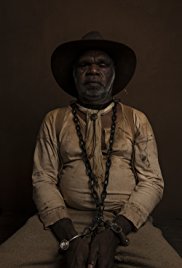A RECOMMENDATION, AN ABORIGINAL FILM STORY, SWEET COUNTRY

SWEET COUNTRY
Australia, 2017, 110 minutes, Colour.
Bryan Brown, Sam Neill, Hamilton Morris, Matt Day, Ewen Leslie, Natassia Gory Furber, Gibson John, Anni Finsterer, Tremayne Doolan, Trevon Doolan, Thomas M. Wright.
Directed by Warwick Thornton.
Here is a film which should be seen by as wide an audience as possible, especially Australian audiences, both indigenous and non-indigenous.
It is based on events that took place in 1929 and was filmed in South Australia. Director and cinematographer, Warwick Thornton, received great acclaim for his film about young people in and around Alice Springs, Samson and Delilah (2009). Thornton has photographed quite a number of films, including The Sapphires, as well as directing some short stories in The Darkside and an episode in Tim Winton’s The Turning.
At one stage, a remark is made that this desert outback is a sweet country, good for cattle. However, audiences immediately realise that it is not necessarily a sweet country for indigenous people. As the credits begin, there is a close-up of water boiling and racist remarks being made offscreen. Then there is a close-up of Sam, an older aboriginal man in a court case. How did this happen?
Sam (a first screen appearance by Hamilton Morris, highly effective and persuasive) lives with his wife and niece on a land spread, managed by a God-fearing, Bible-reading owner, Fred Smith (Sam Neill). All are equal on this property. Suddenly, a neighbouring landowner, Harry Mitchell (Ewen Leslie) comes to ask for help from Fred and then asking for its permission to take Sam and his family to help with work. Harry Mitchell served on the Western front, does not believe in God’s presence nor in equality. He is harsh with Sam, has a lustful eye on the niece, exploits Sam’s wife. He is also harsh with the young aboriginal lad, Philomach, who belongs to another neighbouring spread.
Complications ensue, the boy, in chains, runs away, Mitchell goes in pursuit, confronting Sam, guns drawn and Mitchell shot. Sam realises that in killing a white man, it will be hard for him to get a hearing and justice. He and his wife go walkabout.
In town, the local policeman, Fletcher, Bryan Brown, is definitely in charge, a touch of the genial but also more than a touch of the arrogant. A significant part of the plot is his going out into the desert in pursuit of Sam and his falling victim to the desert and lack of water.
When Sam gives himself up, a young judge (Matt Day) arrives, rejects the suggestion that the case be held in the bar, takes it outside with a desk and deck chairs. Fred is there in support of Sam.
The court scene is very moving, the young judge, rather inexperienced and a bit full of himself, makes demands in his questions, impatient for answers, not appreciating the pace of indigenous reflection and response.
The screenplay leads the audience to an appreciation of Sam, as well as the old aboriginal man, Archie (Gibson John also in a first film role) who was taken from his family and is subservient to the white owner, to watching Philomach, and wondering where he will finish. But the film also dramatises the exploitation of the indigenous, both men and women, by insensitive and cruel white men, treating the workers as the equivalent of slaves, no respect for them as persons, a rugged atmosphere, a rugged life, with seemingly no future for the indigenous men.
But, in 2018, almost 90 years later, an indigenous director all is telling the story and reminding everyone of the shame.